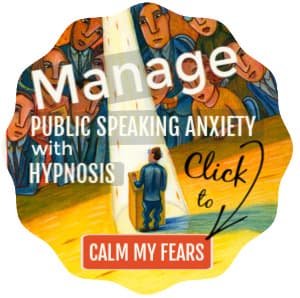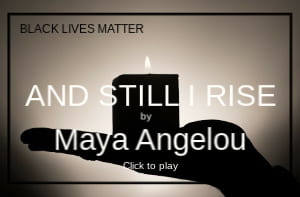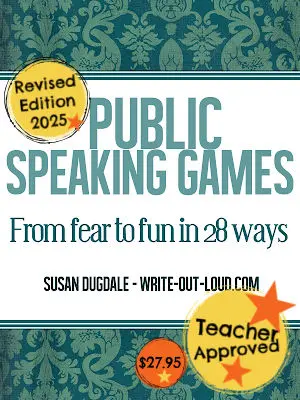- HOME ›
- Poems to read aloud ›
- How to read a poem aloud well
How to read poetry aloud well
- step-by-step help to nail reading a poem
By: Susan Dugdale
So you want to learn how to read poetry aloud. Good on you. That's great!
And it's probably because you're preparing for a special occasion.
You are going to stand in front of others to deliver the poem you've chosen. Perhaps at a birthday celebration? A wedding? Maybe a funeral? Or a class presentation?
For many people this is totally terrifying.
They're scared they'll stumble over the words, won't understand what the poem is about and, consequently make a complete fool of themselves.
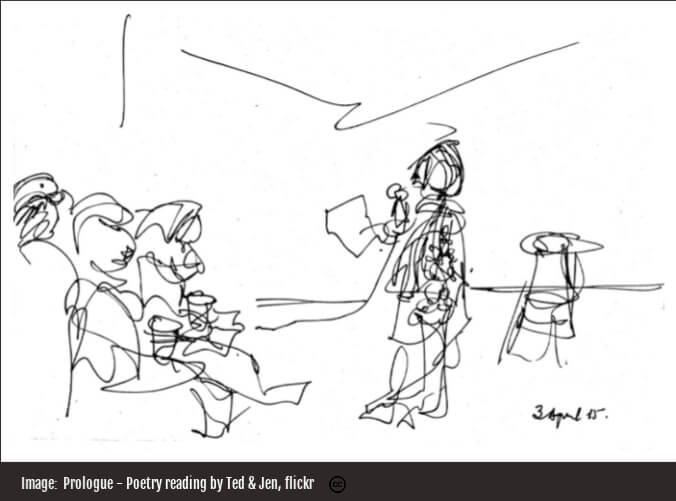
If this is you, relax.
A poem is not a poisonous snake. It will not bite, and you do not have to tip-toe around it.
Learning how to read a poem out loud is relatively straightforward and with practice you may even get to enjoy it!
How to read a poem aloud
Step one
Read your poem through silently several times to familiarize yourself with its core ideas and images.
What's the main point of this poem? What's the poet saying? (Can you put that into your own words? Try. It will help you make sense of it.)
Similarly, allow yourself to see the images/scenarios created by the words in your imagination. Likewise feel the emotions.
The more you understand and get inside the poem, the more likely your audience will be able to understand it when you deliver it.
Do you know how each word should be said?
Be sure to look up any unfamiliar words in an online dictionary for their meaning and pronunciation.
How to eat a poem

American poet, Eve Merriam has inspired countless people all over the world to play with poetry by making it accessible and fun.
Try her poem aloud.
It's truly delicious!
"Don't be polite.
Bite in.
Pick it up with your fingers and lick the
juice that may run down your chin.
It is ready and ripe now, wherever you are.
You do not need a knife or a fork or a spoon
or plate or napkin or tablecloth.
For there is no core
or stem
or rind
or pit
or seed
or skin
to throw away."
Find more about Eve Merriam here.
Step Two
Read your chosen poem quietly aloud to yourself following the guidelines given by the punctuation, listening for its musicality or beat.
If you need them, there are tips for interpreting punctuation here.
Read slowly. Allow each word its space. The temptation is to rush. Resist it.
Once you've 'got the flow' of it, stand up and read the poem aloud authoritatively.
Step three
Now that you're more confident 'play' with your delivery, experimenting with vocal variety.
For example, what happens if you stress this word rather than that word? Does it change the meaning? How?
Say your poem as many ways as you can.
Say it loud. Say it soft. Say it gathering speed, getting faster and faster. Say it slow and low. Say it with a silly accent.
In short, have fun with it. Experiment! And record what you do.
When you play the recordings back, you'll find some of the ways you've tried will sound much better than others. Take the ways that work, blend them and try again.
Poems are very forgiving. You can flub the words and mangle the meaning but they will not break.
5 different readings of How to eat a poem
To illustrate how a poem is said alters how it's experienced by those listening to it, I recorded Eve Merriam's poem 'How to eat a poem' five different ways.
- You can hear it fast: 'How to eat a poem' read quickly
- You can hear it slow: 'How to eat a poem' read slowly
- You can hear it with heavy stresses or emphasis on various random words: 'How to eat a poem' read with stressed words
- You can hear it whispered: 'How to eat a poem' read in a whisper
- And lastly, you can hear it as I might deliver it to an audience: 'How to eat a poem'
Click the link to find out more about playing with vocal variety: the way you say words.
Rehearsal and feedback
Read your poem in front of several friends before going 'live'.
Have them give you feedback on:
- clarity
Could they hear and understand your words? - meaning
Did they understand the images and feelings of the poem? Could they follow the story, or the poet's intent? - speaking rate
Were you speaking too fast or too slowly? - voice
Too loud, too soft, too high, too low... - body language/gesture and stance
Was it expressive, effective, and appropriate? Or too much? Or too little? - notes - how they were handled
Did you have a copy of your poem on a stand in front of you? Was it on your phone? Did you manage reading from whatever device it was on effectively? Was there eye contact with the audience? Or were you reading head down for the entire time?
Incorporate their feedback and then present your poem.
Extra tips on reading poetry aloud
- You do not need a 'dramatic' voice to be successful. An assumed voice, one other than your own, will seem artificial and strained.
When you 'act' or 'perform', rather than read, you make yourself the center of attention and the integrity of the poem is compromised. - Remember to breathe. Holding your breath heightens tension, which in turn heightens the tone of your voice.
- Use the natural pauses in the poem to take a breath, for example on a comma, full stop or period.
- If the occasion is emotional for example, the poem is part of eulogy, wedding or retirement speech, print it out in a large clear font so it is easily read. Marking the pauses, breath or stress points using a highlighter, will also help you remember what you rehearsed.
- Stand tall and relaxed, just as you would for delivering a speech.
- And just in case you need them, here's tips for managing
public speaking anxiety and some good breathing exercises.
Reading poetry aloud is a gift
The ability to read poetry aloud is a gift of immense value.
Because the right poem, read well, expresses with grace and clarity thoughts and feelings that are often difficult to find appropriate words for in ordinary, everyday conversation.
For instance I recently read this beautiful Bub Bridger poem - Wild Daisies at my niece's wedding. (See the excerpt below. This is the last segment of the poem.)
If you're wanting a reading about love that is both simple and profound do take a look. At the reception I got numerous compliments for choosing the poem and for the way I delivered it. Sadly, I could only accept half of them - those about its reading as Ruth, my niece, selected it.
(What great taste she has! ☺)
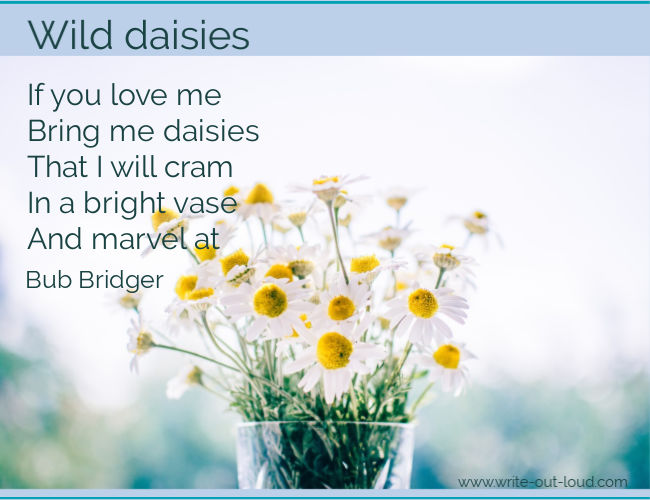
Would you like to listen to some poems?
You'll hear me, Susan, reading them. There are two collections of poems for funerals.
I recorded these to help people searching for a poem to read as part of a service. Hearing, as well as reading them, makes it easier to decide whether a poem fits their needs.
- I am Standing Upon the Seashore
- Do Not Stand at My Grave and Weep
- Funeral Blues
- Prayer of St. Francis of Assisi
All four are popular choices.
You'll find them on this page: funeral poem readings.
Readings of 4 'Remember Me' funeral poems
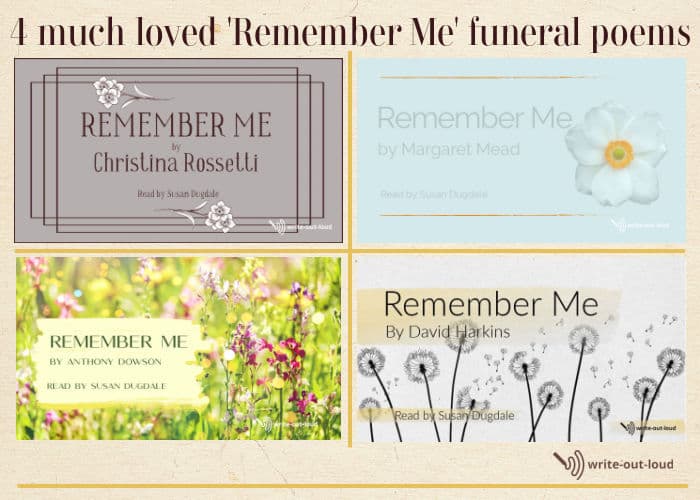
You'll find the text of each poem, along with an interpretation, (a guide to its meaning), audio, and a printable, here: Funeral poems: Remember Me.
Readings of much-loved children's poems
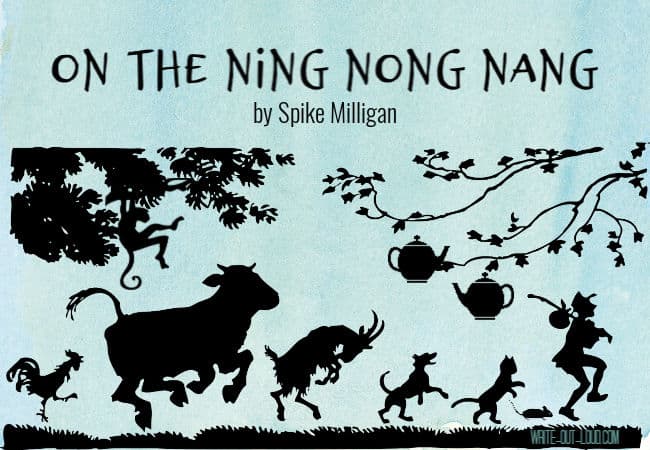
There are also recordings of 6 much-loved children's nonsense poems. You'll find those here, along with activity suggestions and printables: poems for kids
Or perhaps you'd like to write and read a poem of your own?
It's not as difficult as you may think to craft something original and special. The result may not be award winning! However, that's not the aim of the exercise. If your wish is to express your thoughts and feelings uniquely, you can.
Find out here how to write a poem in free verse.
Related poetry pages you may enjoy:
- a large selection of timeless, cross-cultural poems for funerals
- my favorite wedding poems and readings - another across time and cultures collection
- an insanely long page of inspirational quotations, eulogy quotes and funeral readings. My excuse for the length of page? There were too many of beauty and value! How could I leave any out?
- 6 poems for kids of all ages. Much loved nonsense poems with activity suggestions. Plus audio and a downloadable printable of all the poems. Perfect for at-home teaching.
- Return to top of how to read poetry aloud

